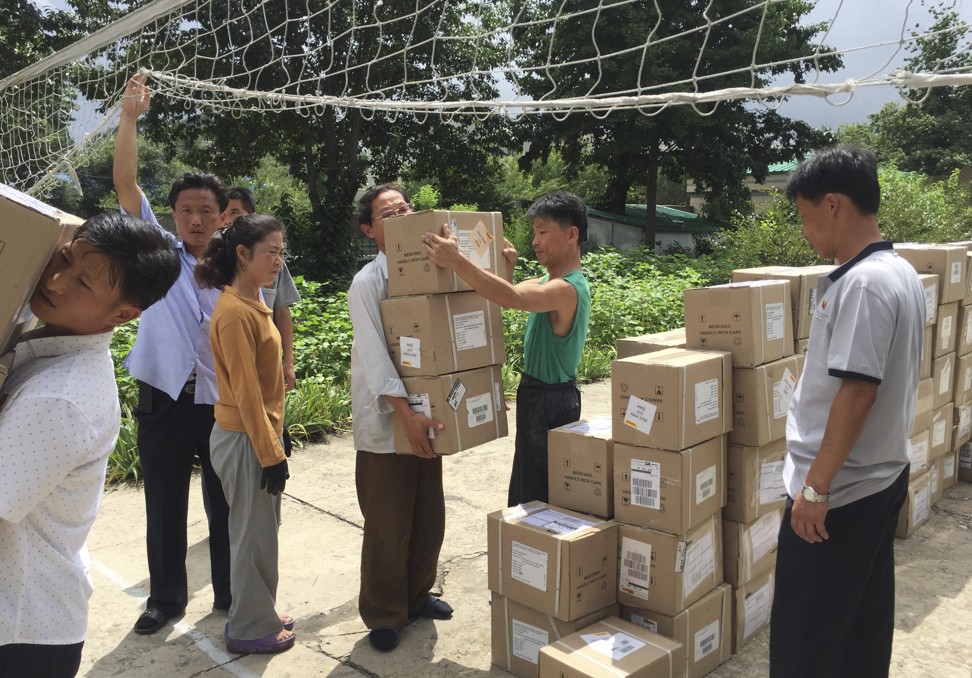
Charity shipments to North Korea stopped at Chinese port, aid groups say
Shipping containers with hygiene kits for people with tuberculosis or hepatitis stuck in Dalian for weeks
Two shipping containers full of hygiene kits languish for weeks in a Chinese port, unable to reach North Korea. They’re intended for people with tuberculosis or hepatitis, not to advance nuclear or missile programmes, but Chinese customs officers see something objectionable in the cargo: nail clippers.
As sanctions on Kim Jong-un’s government intensify, the few aid groups operating in North Korea are facing sometimes bewildering economic restrictions and bureaucratic hurdles that could cripple life-saving work. While the UN Security Council says the penalties shouldn’t affect humanitarian help, the Trump administration cites even North Korea’s reported food and fuel shortages as evidence of a pressure campaign working.
The nail clippers were part of a consignment sent by Christian Friends of Korea, among the US charities working in North Korea despite escalating nuclear tensions. The latest round of UN sanctions bans the supply of metal items, so that explains the clipper hold-up.
It’s not the only example. The American Friends Services Committee, another aid group, is struggling to deliver agricultural equipment such as threshers, compost makers and shovels.
“Sanctions should not have an impact on the well-being of ordinary citizens,” said Linda Lewis, a member of the Quaker committee that’s helped North Korean farmers for two decades. “This work should not be shut down for political reasons.”
Citing reports last week from Tokyo of scores of North Korean fishing boats, with dead crews, drifting into Japanese waters, US Secretary of State Rex Tillerson said the sanctions were “really starting to hurt”. The human suffering, he said, was North Korea’s responsibility and an “unavoidable outcome” of its failure to help its own people.

Tillerson also doubted that humanitarian assistance, which South Korea is considering, would reach the right people in the North.
Charity groups need special export licences from the departments of commerce or treasury, special US customs inspections of their cargo and State Department waivers to travel to North Korea. They also must contend with reluctant banks and suppliers, fearful of being fined for any transaction related to North Korea.
In the case of the nail clippers, Heidi Linton of the Christian Friends of Korea, which supports more than 30 tuberculosis and hepatitis care centres, said its routine shipment of hygiene kits was stuck this month in the northern Chinese port of Dalian for two weeks. Finally, Chinese customs gave special permission for the shipment to proceed. Without that decision, Linton would have had to pay people to individually unpack the metal nail clippers from several thousand kits for the two containers to be cleared.
“To what purpose?” asked a relieved and grateful Linton, who now wonders whether her group can import a replacement clutch for its vehicle in North Korea. It needs other metal items for renovating clinics and for clean water projects.
Lewis, from the Quaker aid group, echoed the sentiment.
“Now we can’t even send shovels, anything made of steel,” she said. Her group helps four cooperative farms in North Korea and had no problem with shipping basic agricultural equipment just a few months ago.
Lewis joked the specific prohibition covering shovels must be an “excessively conservative interpretation” of dual-use technologies that are targeted in UN sanctions because they can have both peaceful civilian lethal military uses. It’s unclear what specific military use a shovel has.
For North Korea’s civilians, the aid groups play a crucial role. The UN works on child health care and provided food for more than 800,000 North Koreans last year. “Sanctions may be adversely affecting that essential help,” UN human rights chief Zeid Ra’ad al-Hussein told the Security Council last month.
The country is in far better shape than the famine years of the 1990s, when hundreds of thousands starved to death. But 70 per cent of the people still suffer food insecurity, and two in five are undernourished, according to the UN.
Chinese foreign ministry spokeswoman Hua Chunying acknowledged the problems with humanitarian aid resulting from the North Korea sanctions, but said her country “always completely and strictly implements Security Council resolutions”.

